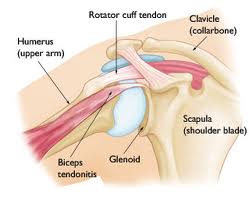Biceps tendonitis, also called bicipital tendonitits, is inflammation that causes pain in the front part of the shoulder or upper arm. It occurs from overuse of the arm and shoulder or from an injury to the biceps tendon.
Symptoms of biceps tendonitis include pain when moving the arm and shoulder, especially forward over the shoulder height. During this movement, pain is felt in the frontal region of the shoulder.
Biceps Tendonitis Diagnosis/Definition
Results from overuse microtrauma of the biceps tendon unit secondary to repetitive flexions and/or supination.
Biceps Tendonitis Initial Diagnosis and Management
- History and physical examination.
- Rest of the affected muscle-tendon bone unit
- Ice compression.
- NSAIDs
- Adults – 200 to 400 milligrams (mg) every four to six hours as needed for up to 2 weeks. Example: Ibuprofen
- Take tablet or capsule forms of these medicines with a full glass (8 ounces) of water.
- Do not lie down for about 15 to 30 minutes after taking the medicine. This helps to prevent irritation that may lead to trouble in swallowing.
- To lessen stomach upset, these medicines should be taken with food or an antacid
- Elevation and support
- Appropriate restrictions of activity.
Biceps Tendonitis Ongoing Management and Objectives
- Rest is individualized depending upon severity
- Flexibility and strengthening exercises
- Ice for 10 to 15 mins with hourly reapplication.
- Elevate arm frequently with compressive wraps.
Biceps Tendonitis Indication a Profile is Needed
- Any limitations that affect strength, range of motion, and general efficiency of upper arm, shoulder girdle, and upper back, including cervical and thoracic vertebrae.
- Slightly limited mobility of joints, muscular weakness, or other musculo-skeletal defects that may prevent hand-to-hand fighting and disqualifies for prolonged effort.
- Defects or impairments that require significant restriction of use
Indications for Referral to Specialty Care
Successfully managed by the primary care physician but refractory cases may mandate a referral.
Referral criteria for Return to Primary Care
The goal of rehabilitation is to return you to your sport or activity as soon as safely possible. Everyone recovers from biceps tendonitis injury at a different rate. In general, the longer you have symptoms before you start treatment, the longer it will take to get better. Biceps tendonitis can be prevented through proper warm up and stretching prior to activity.

